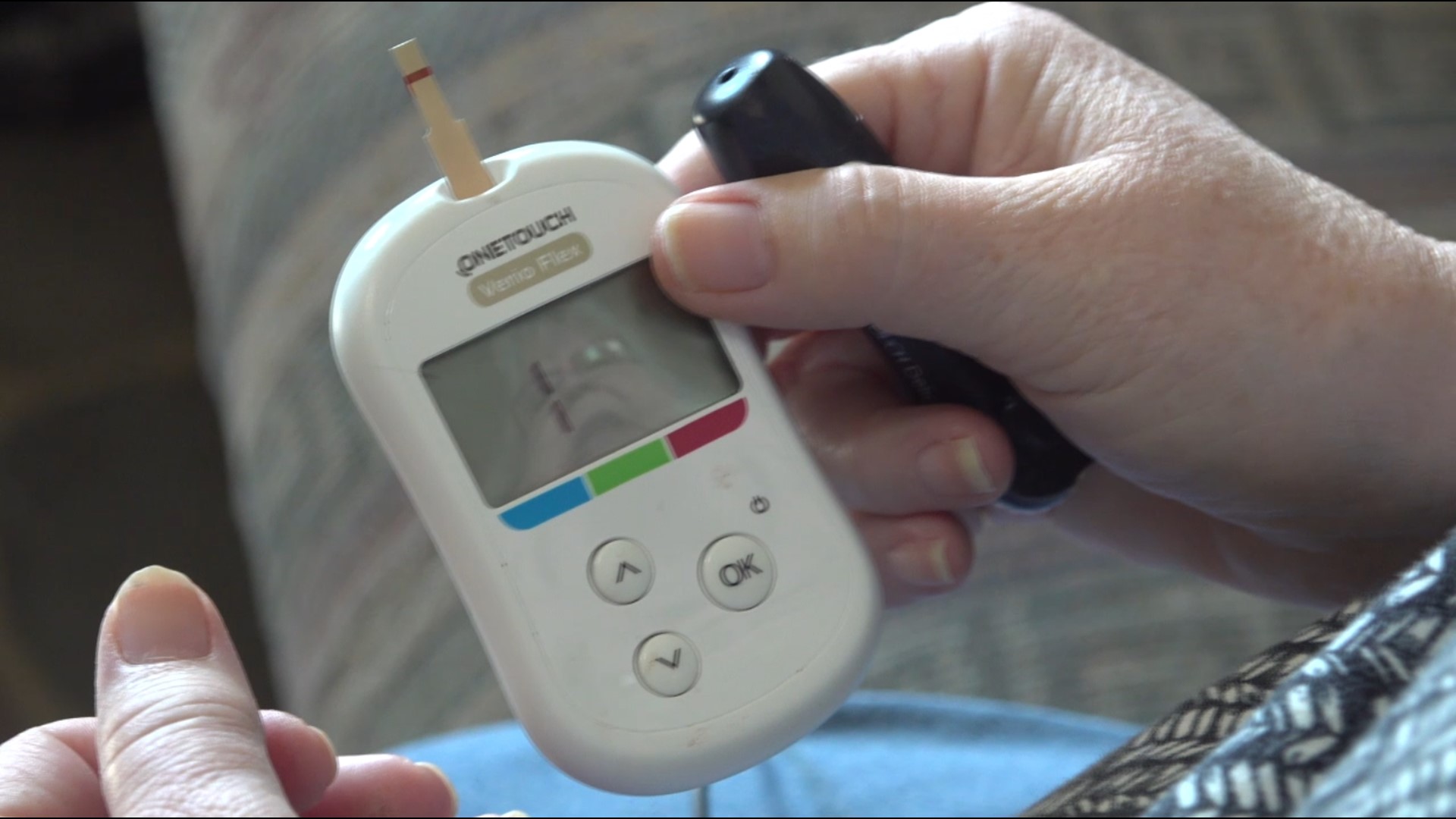HARRISBURG, Pa. — Linda Pentz of Spring Grove, York County has had type 2 diabetes since 1987. She must take her blood sugar five to six times a day.
Pentz said she has learned to live with taking insulin, but she struggles to pay for it.
Her two different insulins cost $90 for a three-month supply. Then comes the $75 three-month supply of test strips and the $50 three-month supply of needles, and then the cost of her glucose meter, which needs to be replaced about once a year.
Her doctor also recently prescribed the Libre continuous glucose monitoring system that will be attached to her upper arm.
“And you have your other expenses. I’m also on heart medicine, which is expensive,” Pentz added.
Pentz pays much less than the retail price for her medications because she is enrolled in PACE, Pennsylvania’s Prescription Assistance Program for seniors. Still, she thinks the government should do more to lower prices for everyone.
“The younger people need help too with the price, especially if they’re on insulin or their children are on insulin,” she said. “It’s a big burden for everybody.”
High medication costs have emerged as a central theme of the 2022 midterm elections. Americans pay nearly three times as much as people in other countries for the same drugs, according to White House officials. The reason behind the sky-high prices is that drug companies are allowed to set their own prices with virtually no limits.
In September, Congress passed the Inflation Reduction Act, which caps insulin costs at $35 a month and allows Medicare to negotiate prices for its most expensive drugs. However, insulin price caps don’t begin until 2023, and price negotiations don’t begin until 2026. Furthermore, the price controls only apply to people on Medicare and Medicaid.
Here is what state, and federal-level candidates, are saying they will do to cut costs for seniors and everyone else:
On the state level, the Pennsylvania governor can’t compel pharmaceutical companies to change drug prices, but he can influence state programs.
In a one-on-one interview with the Democratic gubernatorial candidate, Josh Shapiro said he would expand services for low-income senior Pennsylvanians.
“My plan would be to attack PACE and PACENET, which so many Pennsylvania seniors rely on and to use that to reduce the cost,” Shapiro said.
The current state Attorney General would also try to negotiate better prices for state employee health plans.
“We need the Commonwealth of Pennsylvania to do a better job of negotiating drug prices. We’re giving up our leverage when it comes to negotiating the prescription drug price cost and we’re going to do a better job of that,” Shapiro said. “I also think we need to take the middle people out of this. There are organizations that the Commonwealth hires to manage drug prices. It seems like they keep making a lot money and the people who need the prescription drugs keep getting screwed.”
Republican opponent Doug Mastriano did not respond to multiple requests for an interview to cover this topic and others, but in 2021 the state senator introduced legislation in the Pennsylvania Senate to cap insulin prices at $30 a month per patient. He cited the fact that the four most popular types of insulin tripled in price in the last decade.
“Why are the costs going up for an old medication that's been around for a century, when in other countries, like in Europe and Australia and elsewhere, people aren't paying out of pocket as much?” he said in an interview with FOX43 on Dec. 3, 2021.
The Affordable Insulin Act was never brought to a vote.
On the federal level, the U.S. senator from Pennsylvania can vote on legislation to directly limit drug prices.
Republican Senate candidate Dr. Mehmet Oz has said he does not support the Inflation Reduction Act.
When asked if he supported the specific provisions in the law to negotiate Medicare drug prices and whether he would support expanding negotiations for those with private insurance, Oz responded:
“I’d be interested in looking at this in more detail. You’re asking a fairly complicated question. But the problems with the Inflation Reduction Act were not the parts of it that dealt with reducing healthcare costs for Americans.”
Pharmaceutical companies have argued they charge more than the production costs for medications in order to continue the research and development of new drugs. Oz said he had a solution to streamline research and development costs.
“If we, at the federal government level, said we’re going to create these groups of medical centers. They’re going to do clinical trials more quickly and very rapidly figure out if these drugs work or not,” Oz said at an Oct. 19 Rotary Club event in York County.
“Right now it’s one in 20 medications succeeds, but we’re all paying for the other 19, even though we never get the benefit from them because somebody’s gotta’ pay for the experiments and the research. We can make that one in 10, maybe. That would dramatically drop the cost and medications and we would expect and insist that that money comes back to the American people," he continued.
Democratic Senate candidate John Fetterman did not make himself available for a one-on-one interview with FOX43, but he wrote in a statement,
“I will push to bring down the cost of prescription drugs by continuing to take on the pharmaceutical companies that jack up prices… We have finally passed a law to allow Medicare to negotiate certain drug prices and cap annual prescription drug costs for seniors, but we cannot stop there– we must allow for the importation of lower-priced prescription drugs from other countries and limit drug costs for all Americans.”

